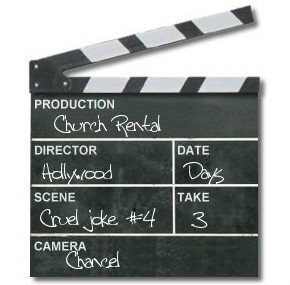Take the money and run? When Hollywood came calling: When Hollywood came calling

The day after Easter my church received a surprise visit from a Hollywood location scout. He offered us $10,000 to shut down our sanctuary for three days so that his company could use it to film the wedding scene from an upcoming Adam Sandler movie. The film's plot involves a teenager who impregnates his schoolteacher (the Mary Kay Letourneau story played for comic effect). The wedding scene takes place years later, when the offspring of this illicit union is a grown man getting married. Our sanctuary would be featured in a scene that included a fistfight between a priest and a worshiper whose telephone repeatedly interrupts the marriage ceremony.
I'm sure that I'm not the only pastor who's been tempted to throw a punch at a wedding ceremony cell phone user. That bit resonated with me. And I've seen enough Adam Sandler movies to know that the funniest scene from any of his films is the fistfight he had with Bob Barker on a golf course in Happy Gilmore. The thought of paying homage to that particular ridiculousness right in our sanctuary made me smile.
Read our latest issue or browse back issues.
Moreover, the offer happened to arrive on the same day that our office staff spent hours stuffing hundreds of envelopes announcing the kickoff of our latest capital campaign—an effort to raise $100,000 quickly in order to renovate our Sunday school facility during the summer.
So I thought about saying yes. And then I remembered what a pain it is to rent the church out for anything. Over the years I've come to regret leasing space for quinceañeras, Suzuki violin recitals, 50th wedding anniversaries and politicians' birthday parties. There are always spills, odd requests, demanding guests and insurance riders. At its best, the church is good at being the church. In my experience we don't do much else well. So if we don't make it as a good banquet hall, what chance did we stand to be the site of a major motion picture?
Beneath these practical concerns lay a more fundamental anxiety. For good and for ill my church is a classic mainline, main-street, tall-steeple, in-bed-with-the-larger-culture sort of place. Sectarian appeals carry very little weight with me or with the members of my congregation. Even when I'm the one stating the case, I rarely find myself persuaded. But in this instance, I found myself with nothing to say but "Hollywood? That's just not who we are."
I am not the kind of Christian who would boycott a movie (I might wind up watching this one). But the church I serve is not mine, and I found myself wanting to protect its true owner from the world.
Because I was barely able to convince myself of this, and was certainly unable to make the case in language that would convince the pragmatists I serve, I didn't try to explain myself. I just said no to the location scout. It felt good. And then Hollywood called back and offered us $60,000.
According to my understanding of congregational polity, a pastor has the authority to turn down money. But not that much money.
We convened our deacons the next day. When the meeting began I was perplexed. Sixty thousand dollars would not determine the future of our church, but it would certainly make things much easier in the short run. Still, I had reservations. Uncertain of what to do, I stayed on the sidelines, frustrated at my own irresolution and slightly embarrassed that my scruples seemed to have a $50,000 price tag.
At the start of the meeting our senior deacon took a straw poll and found that 18 of the people in the room were in favor of accepting the offer. Five were opposed. These five felt strongly, arguing that no matter how lighthearted the treatment might be, our church should not be involved in a story that gets laughs from the sexual exploitation of an adolescent. But this was a decidedly minority opinion. The notion of turning down "free money" just as we needed to raise money did not make sense to most of our deacons. We spent nearly two hours discussing how difficult it is to find funds in a down economy . . . what a powerful impact this unexpected windfall might have on the children of our church . . . how beautiful our Sunday school might look.
We talked and talked, yet not one mind was changed. It looked as if we would have to settle for a lack of consensus—one that carried a nice payoff. We would take the money. After that we would try to patch things up with the people who were offended.
Then all of a sudden one of our longtime deacons said, "Look—it seems as if saying yes to this offer is going to hurt some members of the congregation. Not most people. Obviously not the majority. But some people. So I guess the question isn't about a movie. It's about us. Is $60,000 worth hurting some of our members?"
Five minutes later the deacons voted unanimously to turn down the offer even though most of them thought we should accept it. We went from polarized to selfless in a matter of seconds. I have mouthed unanswered prayers inviting Jesus to join our meetings dozens of times. I have interrupted agendas to speak confidently about his presence when he is nowhere to be found. This time I kept my mouth shut, and he walked right in.




